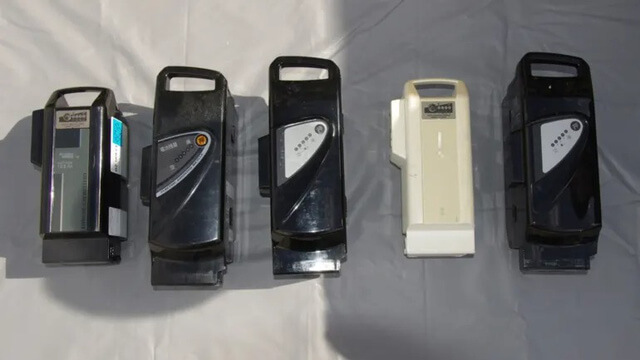Avoiding public transport due to Covid-19, Japanese accidentally face new "enemy"
As bicycles gain popularity as an alternative to Japan's crowded trains and buses amid the coronavirus, thieves are homing in on electric bike batteries as a quick way to make some extra cash.
"Stealing batteries from electric bikes is easy, and I got caught up in it," a 49-year-old man told Osaka police after he was arrested in August for stealing a battery from a bike stand in the city of Yao.
During July and August, more than 20 bicycle battery thefts occurred in Yao County, Osaka Prefecture. According to people familiar with the matter, the police are investigating whether the man is related to these cases.
In recent years, battery theft cases have been steadily increasing. But this year, the number of cases has surged. As of the end of October, Osaka Prefecture had recorded 338 cases significantly higher than last year's 129 cases.
To date, Tokyo has recorded 266 cases, surpassing the 213 annual records since 2019.
It is also extremely difficult to identify stolen batteries, so they are easy to resell. Japan requires bicycles to be registered to prevent theft, but batteries that are designed to be easily removable and rechargeable are not registered.
While many batteries have serial numbers from manufacturers, few people keep records of the actual number. The sticker labels can be removed as well, making stolen batteries virtually indistinguishable from legitimate products.
The batteries usually last five to eight years, and cost between 30,000 yen and 60,000 yen ($260 to $520) to replace, according to manufacturers.
Another man in his 40s, who was arrested for bike battery theft in June, had apparently listed 50 stolen batteries on a flea market app for around 10,000 yen to 20,000 yen a piece.
"Batteries are a consumable product," a senior police investigator said. "He probably decided to steal batteries, thinking that people would buy them if he offered a lower price than official channels."
The batteries on bikes are usually secured with a padlock. A large portion of theft occurs when owners leave their bikes with the key unattended, according to Japan's Metropolitan Police Department. But she warned that experienced thieves can unlock locks in seconds even without a key.
Battery theft is only expected to become a bigger problem as electric bikes become more and more common. Owners may need to start storing bikes indoors and make other adjustments to keep thieves away.
"In order to prevent thefts and resale of batteries, we should consider a new system for identifying their owners, like engraving serial numbers instead of using stickers," a senior police official said.
"Stealing batteries from electric bikes is easy, and I got caught up in it," a 49-year-old man told Osaka police after he was arrested in August for stealing a battery from a bike stand in the city of Yao.
 Source: Internet
Source: Internet
During July and August, more than 20 bicycle battery thefts occurred in Yao County, Osaka Prefecture. According to people familiar with the matter, the police are investigating whether the man is related to these cases.
In recent years, battery theft cases have been steadily increasing. But this year, the number of cases has surged. As of the end of October, Osaka Prefecture had recorded 338 cases significantly higher than last year's 129 cases.
To date, Tokyo has recorded 266 cases, surpassing the 213 annual records since 2019.
 Source: Internet
Source: Internet
It is also extremely difficult to identify stolen batteries, so they are easy to resell. Japan requires bicycles to be registered to prevent theft, but batteries that are designed to be easily removable and rechargeable are not registered.
While many batteries have serial numbers from manufacturers, few people keep records of the actual number. The sticker labels can be removed as well, making stolen batteries virtually indistinguishable from legitimate products.
The batteries usually last five to eight years, and cost between 30,000 yen and 60,000 yen ($260 to $520) to replace, according to manufacturers.
Another man in his 40s, who was arrested for bike battery theft in June, had apparently listed 50 stolen batteries on a flea market app for around 10,000 yen to 20,000 yen a piece.
"Batteries are a consumable product," a senior police investigator said. "He probably decided to steal batteries, thinking that people would buy them if he offered a lower price than official channels."
The batteries on bikes are usually secured with a padlock. A large portion of theft occurs when owners leave their bikes with the key unattended, according to Japan's Metropolitan Police Department. But she warned that experienced thieves can unlock locks in seconds even without a key.
Battery theft is only expected to become a bigger problem as electric bikes become more and more common. Owners may need to start storing bikes indoors and make other adjustments to keep thieves away.
"In order to prevent thefts and resale of batteries, we should consider a new system for identifying their owners, like engraving serial numbers instead of using stickers," a senior police official said.
Share this article
Advertisement